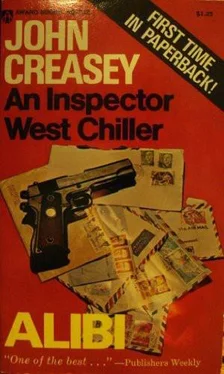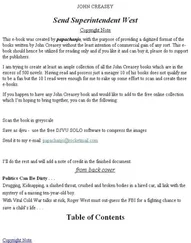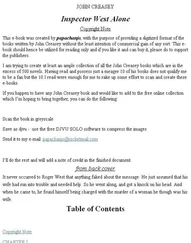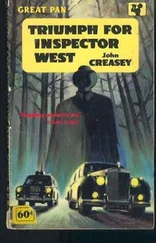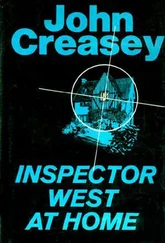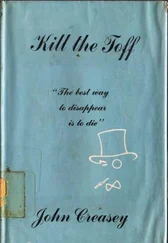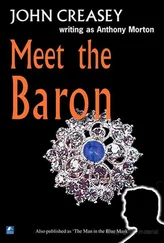John Creasey - Alibi
Здесь есть возможность читать онлайн «John Creasey - Alibi» весь текст электронной книги совершенно бесплатно (целиком полную версию без сокращений). В некоторых случаях можно слушать аудио, скачать через торрент в формате fb2 и присутствует краткое содержание. Жанр: Старинная литература, на русском языке. Описание произведения, (предисловие) а так же отзывы посетителей доступны на портале библиотеки ЛибКат.
- Название:Alibi
- Автор:
- Жанр:
- Год:неизвестен
- ISBN:нет данных
- Рейтинг книги:4 / 5. Голосов: 1
-
Избранное:Добавить в избранное
- Отзывы:
-
Ваша оценка:
- 80
- 1
- 2
- 3
- 4
- 5
Alibi: краткое содержание, описание и аннотация
Предлагаем к чтению аннотацию, описание, краткое содержание или предисловие (зависит от того, что написал сам автор книги «Alibi»). Если вы не нашли необходимую информацию о книге — напишите в комментариях, мы постараемся отыскать её.
Alibi — читать онлайн бесплатно полную книгу (весь текст) целиком
Ниже представлен текст книги, разбитый по страницам. Система сохранения места последней прочитанной страницы, позволяет с удобством читать онлайн бесплатно книгу «Alibi», без необходимости каждый раз заново искать на чём Вы остановились. Поставьте закладку, и сможете в любой момент перейти на страницу, на которой закончили чтение.
Интервал:
Закладка:
“And what?” he asked Cole.
“The witness, Wilfred Smithson, died in a road accident late last night,” stated Blackie flatly. “Not a hit and run, but the driver was probably drunk.” He paused again and then added almost superfluously. “That makes the pastry-cook even more important.”
Now there seemed not the slightest doubt that there was deep significance behind the Verdi affair. There had been yesterday’s stubborn attempt to get dismissal of the charge and now this tragedy; together they were too much for a coincidence.
Roger said roughly, “We must watch Campbell like lynxes.”
“I’ve got his home covered, back and front,” Blackie assured him. “I thought you should know straight away.”
“You couldn’t be more right,” Roger approved. The bedside clock told him that it was a little after six. Janet had snuggled down again and he thought she was more asleep than awake. “Anything else?”
“No,” said Blackie, and gave a grim laugh. “Isn’t that enough?”
“What about the driver of the car?”
“He’s a man named Fogarty, and we’re holding him at North Kensington. The accident happened in Fulham at Fulham Broadway, just after eleven o’clock last night. The night man at North Ken tied Smithson in with your court affair and put word through at once. So we did a very quick job on Fogarty. Howard has all the details.”
“Thanks,” said Roger. At least that was one good thing.
He rang off, and got out of bed. Janet stirred but did not speak, perhaps her way of saying that she wanted to try to get off to sleep again. In a way he would be glad to be out of the house before she was up and there was more discussion about and with Scoop. There could be no argument: he had to start on this new stage of the investigation very quickly. After last night Janet should be all right; in a way it might even be better for her to have an hour with the boys on their own. He bathed, dressed, shaved, and was downstairs in twenty minutes, making tea and toast; he disliked starting out without anything to eat.
Half an hour after receiving the telephone call he was driving through nearly deserted streets towards North Kensington, only twenty minutes away. He passed two dust-carts, some red Post Office vans, some milk-carts and several newspaper boys on bicycles, before he pulled up outside the Victorian red-brick building. A constable standing outside the entrance regarded him at first with disapproval and then, on recognition, almost with alarm. Roger nodded and strode up the steps. The duty sergeant in the charge room on the right of the main hall, was yawning over some reports. He looked up, saw Roger, and sprang to attention.
“Mr. West!”
“Who’s in charge?” asked Roger.
“Superintendent Howard, sir. First on the right at the top of the stairs,” he added as Roger began to turn away.
Roger went up the stairs two at a time, yet Howard, a bulky man and near the end of his police service, was at the open door of the room by the time Roger appeared. He was swift-moving and fast-thinking, and as he shook hands he said, “You’re after that driver we’re holding, aren’t you?”
“Yes,” Roger said. “Has he talked about it?”
“He mumbles to himself when he says anything at all, says he didn’t see the man on the zebra crossing, and pretends to be half-drunk still. But we had a medical report, Handsome.” Howard paused, obviously for effect, and Roger obligingly asked, “What’s the report?”
“He didn’t have enough alcohol in his blood to make a kitten drunk,” stated Howard. “He’s stone cold sober, just acting a hangover.”
“Oh,” said Roger, “is he. Know anything about him?”
“We’ve got this,” said Howard, and led the way into the room. On a small table on one side, away from Howard’s roll-top desk, was a collection of oddments obviously taken from a man’s pockets. There was also a Record Card, with fingerprints and a general description. The man’s name was Patrick Fogarty, he was five feet ten inches, blue-eyed, fair-haired, age thirty-seven . . . there were a number of distinguishing marks. He lived by himself in a bed-sitting-room at a house in New King’s Road, Fulham, and he was employed by a large firm of caterers as a van driver. He had a small car of his own, a Morris 1000, which he had been driving at the time of the accident.
“Have you had his room searched?”
“Damn it,” protested Howard, “it’s only a case of drunken driving, even if the man he ran down was one of your witnesses.”
“How did you know that?” asked Roger.
“Blackie mentioned it when he was on the telephone,” Howard replied. “Want to see Fogarty?”
“I’d better,” Roger said.
But the man was stretched out on the bed in his cell, snoring away, as apparently he had been for some time. The policeman on cell duty said he hadn’t stopped snoring, once he had started. The description was accurate enough except that it hadn’t told how broad and thick Fogarty was, as powerful-looking a man as Roger had seen in a long time.
He went back upstairs. On a side table in Howard’s office were some oddments from Fogarty’s pockets, including some keys. Thoughtfully, Roger looked at the keys, and then said, “I’d like to take these, and you’ll need a receipt.”
Howard hesitated, then handed Roger a slip of paper. Roger signed, “Keys taken from the man Fogarty now in my possession,” thanked Howard, and drove to the Yard.
There, Information had particulars of Fogarty and was briefed to get more about his background, employment and friends. Roger went up to his own office and checked with the switchboard about the Justice of the Peace on duty. A justice or a magistrate had to sign every search warrant, and Roger needed a warrant for Fogarty’s place. As he went to see the Justices of the Peace on call, he reflected grimly that until yesterday’s encounter with Coppell he would have searched the room and worried about the warrant afterwards.
The Justice of the Peace, who lived near by, was an even-tempered man who showed no resentment at being disturbed so early in the morning, and signed the warrant on Roger’s brief statement of need.
Now, Roger was at the crossroads again. He should, he knew, take a second man with him to make the search, yet some impulse urged him to go alone. He had acted on impulse once already and still wasn’t sure of the consequences. It was surely folly to take another risk. Never- the less, perhaps because of a need to justify and prove himself, perhaps because he was still resentful at Coppell, and wanted to hand him the case on a plate, he decided to take a quick look on his own. If necessary he could return with another officer later.
It was a little after half past seven when he walked up the steps of the house in New King’s Road, only a mile from his own home. This house was in a small terrace, quite well kept, with seven names and seven bell-pushes on the side of the porch.
Fogarty lived on the third floor.
Reaching his room, Roger put one of the keys in the lock and turned it; it was the right one. He opened the door cautiously. The caution was instinctive, he had no reason to suspect that anyone else was in the room. It was dark, as if the curtains were drawn. Light from the passage shone on a bookcase with some heavy-looking, leatherbound books, and on a chair over which some women’s clothes were draped. A bra, stockings, a girdle.
Good God! thought Roger, what was the matter with him? Why had he taken it for granted that there would be no one else here? If he were caught entering a woman’s room by himself he really would be in trouble. Why hadn’t he brought a man with him? He stood still for a moment until he could make out the breathing of whoever was sleeping there, and while waiting he became aware of stale perfume or powder.
Читать дальшеИнтервал:
Закладка:
Похожие книги на «Alibi»
Представляем Вашему вниманию похожие книги на «Alibi» списком для выбора. Мы отобрали схожую по названию и смыслу литературу в надежде предоставить читателям больше вариантов отыскать новые, интересные, ещё непрочитанные произведения.
Обсуждение, отзывы о книге «Alibi» и просто собственные мнения читателей. Оставьте ваши комментарии, напишите, что Вы думаете о произведении, его смысле или главных героях. Укажите что конкретно понравилось, а что нет, и почему Вы так считаете.
